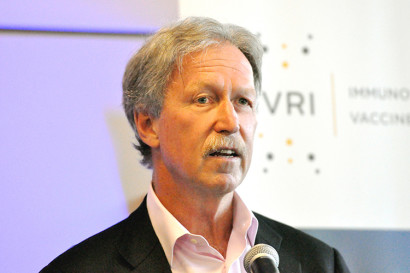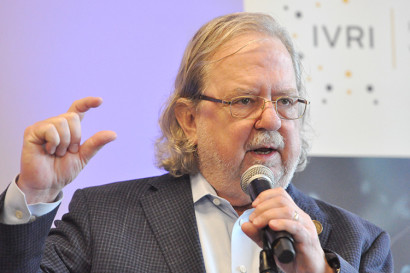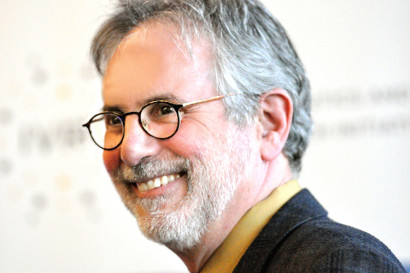Aduro Biotech helps launch new immunotherapy, vaccine effort
UC Berkeley cancer immunologists are teaming up with colleagues working on infectious disease to create a new Immunotherapeutics and Vaccine Research Initiative, fueled by $7.5 million in funding from Aduro Biotech, Inc., a Berkeley company that develops immunotherapies for cancer and other diseases.
Aduro’s three years of funding, with the potential for three more, will support work on some of today’s most promising techniques for stimulating the immune system to fight off cancer and infections. These may include investigating a new class of immune system stimulants called cyclic di-nucleotides, which have shown promise in shrinking tumors and bolstering vaccines against tuberculosis, and research that could help re-arm the immune system’s natural killer cells, which normally attack cancer cells and virus-infected cells, to better fight tumors.
“We’re increasingly finding that immune stimulants associated with disease-causing microbes work as cancer therapies, and conversely, that immunotherapies for cancer may have application in fighting infectious disease,” said IVRI director David Raulet, a professor and co-chair of the Department of Molecular and Cell Biology. “Bringing infectious disease and cancer researchers together in a synergistic research effort at UC Berkeley and Aduro Biotech is an exciting and unique idea, and could be where the next generation of therapies will come from.”
Aduro already uses some of UC Berkeley’s technology, including attenuated Listeria monocytogenes mutants and methods to engineer these bacteria to stimulate the immune system as vaccines for immunotherapy. This technology, pioneered by Dan Portnoy, a UC Berkeley professor who has joint appointments in the Department of Molecular and Cell Biology and the infectious diseases and vaccinology division of the School of Public Health, has been further refined by Aduro scientists and is now being employed in Phase IIB clinical trials for vaccines against pancreatic cancer and mesothelioma.

“Through this unique collaboration, there is tremendous opportunity to improve our understanding of the immune system’s potential to serve as an important weapon in treating cancer and infectious disease,” said Stephen T. Isaacs, chairman, president and CEO of Aduro Biotech. “By combining UC Berkeley’s leading research and academic resources with innovative technology platforms, such as talhose developed by Aduro, we are confident that this initiative will lead to an improved understanding of, and potential treatments for, some of the most devastating diseases.”
The initiative was officially launched at an evening reception on March 24, the eve of a one-day symposium at UC Berkeley titled “Harnessing the Immune System to Fight Cancer and Infectious Diseases.” The symposium was jointly sponsored by UC Berkeley’s Henry Wheeler Center for Emerging and Neglected Diseases and Cancer Research Laboratory.
Berkeley research revived cancer immunotherapy
Much of the excitement around combining these two areas — the immunology of cancer and the immunology of infectious disease — comes from the amazing success of immunotherapy against cancer, which started with the work of James Allison when he was a professor of immunology at UC Berkeley and director of the Cancer Research Laboratory from 1985 to 2004. Allison, now at the University of Texas MD Anderson Cancer Center, discovered a way to release a brake on the body’s immune response to cancer that has proved highly successful at unleashing the immune system to attack melanoma and is being tried against other types of cancer.

Allison’s work revived attempts to rev up the immune system to fight cancer, and has led to many new avenues for creating cancer immune-therapies. In addition to Allison’s technique, which uses an antibody that blocks an immune suppressor called CTLA4, antibodies that block another immune suppressor, PD1, have been successful in treating melanoma, renal cancer and a type of lung cancer. Both CTLA4 and PD1 antibodies are now FDA-approved as cancer therapies.
Another promising avenue involves a protein in cells that responds to foreign DNA to launch an innate immune response — the first response of the body’s immune system. The protein, dubbed STING, is triggered by small molecules called cyclic di-nucleotides (CDN), and makes immune cells release interferon and other cytokines that activate disease-fighting T cells and stimulate the production of antibodies that together kill invading pathogens and destroy cancer cells. Listeria bacteria, for example, secrete a CDN directly into infected cells that activates STING.
Russell Vance, a UC Berkeley professor of molecular and cell biology and current head of the Cancer Research Laboratory, discovered several years ago that the chemical structure of these di-nucleotides is critical to their ability to work in humans. Aduro has since developed a CDN designed to work in humans and found that injecting it directly into a tumor in mice caused the tumor to shrink.
“It’s amazing how these discoveries made by infectious disease researchers have given us an exciting new approach to treat cancer,” Raulet said. “These really are areas that have a lot to say to each other.”
Another IVRI-affiliated researcher, Sarah Stanley, an assistant of public health, has found evidence that CDNs can help improve the imperfect vaccines we have today against tuberculosis.
Researchers at UC Berkeley will have access to Aduro’s novel technology platforms for research use, including its STING pathway activators, proprietary monoclonal antibodies and the engineered listeria bacteria, referred to as LADD (listeria attenuated double-deleted).

Raulet’s own research on natural killer or NK cells of the immune system has contributed to making these cells a new focus of cancer research. Revving up T cells is the goal of most immunotherapies today, but other immune cells, including NK cells, also attack tumors. As tumors advance, NK cells inside the tumors appear to become desensitized, he said. Recent research shows that some cytokines and other immune mediators Raulet discovered are able to “wake them up” and get them to resume their elimination of cancer cells.
“NK cell immunotherapies are very likely to be the next generation to complement T cell immunotherapies,” he predicted.
By focusing on fundamental scientific research to understand the immune system’s biochemical tools and signaling pathways, how the immune system recognizes invaders and how immune cells talk to one another, the IVRI has the potential to discover new ways to selectively target and cure many human diseases.
“The IVRI is a marriage of cancer immunotherapy and infectious disease immunology, where therapies in one area can be effective in the other, and observations in one can be applied to the other,” Raulet said. “It’s exciting to think that drugs tested first in diseases like cancer might have an impact on neglected diseases in the developing world, and that it can work in the other direction too.”
RELATED INFORMATION
